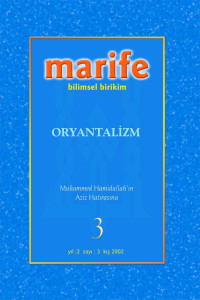Abstract
......................................................................................................................................................................................................................................................
Abstract
Late Nineteenth and the first half of the twentieth centuries of Western literature
on the Qur’an mainly concentrate on two issues. The first group try to seek
to trace the influence of Jewish and Christian ideas on the Qur’an while the second
group pay more attention to the reconstruction of the chronological order of the
Qur’an. This article deals with mainly on the most important figures in the West
whose works are still being read in the Universties. Theodor Nöldeke, Hartwig
Hirschfeld, Richard Bell can be mentioned among these welknown Western students
of Islam. Having disclosed their dissatisfaction with tradition, and acknowledged
their exclusive reliance on the Qur’an, they developed different kinds of Qur’anic
order. Although Nöldeke was the pioneer of the other two, they went further and
rejected the unity of the Qur’anic surahs. Consequently, incontrast to Nöldeke’s
overall scheme they preferred a chronological order which are limited exclusively to
the passages of the Qur’an rather than surahs. Nonetheless, there are also differences
between these two. The difference between Hirschfeld and Bell lies in their
concept of the history of the Qur’an. While Hirschfeld focused on the dogmatic concern
of Qur’anic passages, Bell tried to analyse from several aspects to order
Qur’anic passages. This article displays their similarities and differences together
with the conclusion they have reached
Details
| Primary Language | Turkish |
|---|---|
| Subjects | Religion, Society and Culture Studies |
| Other ID | JA62SB68TG |
| Journal Section | Research Article |
| Authors | |
| Publication Date | December 31, 2002 |
| Acceptance Date | November 26, 2002 |
| Published in Issue | Year 2002 Volume: 2 Issue: 3 |
This work is licensed under a Creative Commons Attribution-NonCommercial 4.0 International License.

